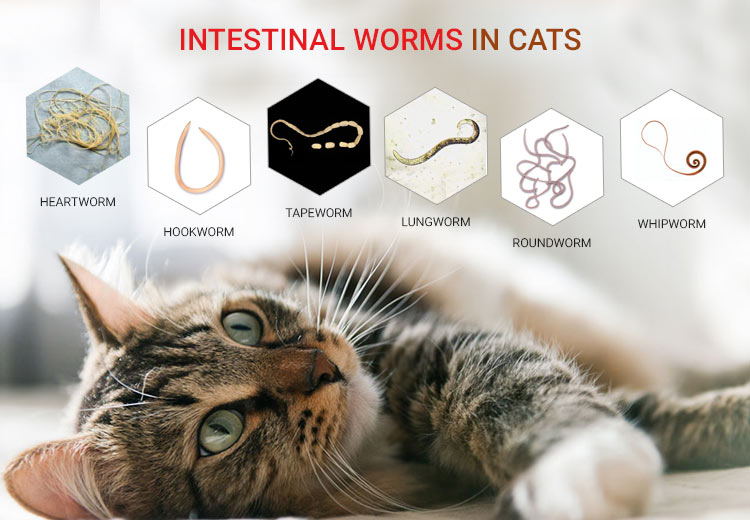Intestinal Worms in Cats: A Thorough Study
Worms are one of the most common diseases affecting cats. They not only live in your kitty’s body for several months or years but also cause discomforts and can be very life-threatening. There are many types of intestinal worms that can infect your cat with the common ones being heartworm, hookworm, lungworm, roundworm, tapeworm, and whipworm.
Types of Gastrointestinal Worms
As mentioned, the above six types of gastrointestinal worms can be very fatal if not treated properly. Let us take a closer look at all of them.
#1. Heartworm
Heartworm disease is one of the most deadly diseases that can affect your cat. These parasites are mainly transmitted by mosquitoes and once they mature, they live and breed in the heart and blood vessels of the lungs.
Size – Heartworm can be close to 30cms in length.
Treatment – Heartworm is close to impossible to treat but they can be prevented through heartworm preventatives.
#2. Hookworm
These horrible parasites live in and around the cat’s digestive system. They attach themselves to the lining of the intestinal wall and feeds on the blood and tissue areas.
Size – Male hookworms are 5 to 9mm long while female ones are approximately 1 cm in length.
Treatment – Hookworm can be treated with the help of dewormers such as Popantel, Exelpet Allwormer, Triworm-C De-wormer and more.
#3. Lungworm
These hair-shaped worms occur when the larvae migrate from the intestine to the lungs via bloodstreams and over time develop into adult worms that lay eggs in the cat’s lungs. Lungworms are infested when cats slugs or snails or preys who have the larval stage of the worm. Feline lungworm is the most common type that affects cats.
Size – Their sizes range from 1 to 4cms.
Treatment – De-wormers or antibiotics are an effective way to treat lungworms. Consult a vet for proper treatment.
#4. Roundworm
They are the most common type of intestinal worms affecting cats. These worms are found in excessively large numbers and can lead to discomforts, abdominal pain/swelling, colic, and stomach issues.
Size – These worms are about 8 to 15cms in length.
Treatment – The best way to treat roundworms is by opting for de-wormers. Antezole Paste or Liquid, Cazitel tablets, Exelpet Allwormer, and Popantel are some of the de-wormers that cure and prevent roundworms in cats.
#5. Tapeworm
These are segmented flatworms that usually reside in the small intestine. They reproduce by clinging onto the gut and pass out with the feces. Tapeworms are generally found in cats that are infested with fleas.
Size – Tapeworms are generally 20cms long.
Treatment – Treating tapeworms aren’t that hard at all especially when you have the luxury to choose from various de-wormers like Exelpet allwormer, Popantel, Panacur Granules, Triworm-C De-wormer, Cazitel tablets, Mediworm, etc.
[Read] Worming Cats: Why and How?
#6. Whipworm
Whipworms are not that common in cats but they do tend to infect a lot of cats across the globe. These worms usually infect cats through ingestion of infested matter and can also develop through various other animals.
Size – Whipworms are usually less than 5cms in length.
Treatment – Wormers like Antezole Paste is arguably the best way to cure whipworms.
As you can see how worms can infect your cat. So make sure to use preventatives as well as safety techniques to lower the risk of worms infecting your feline. Pet safety should be your topmost priority.

